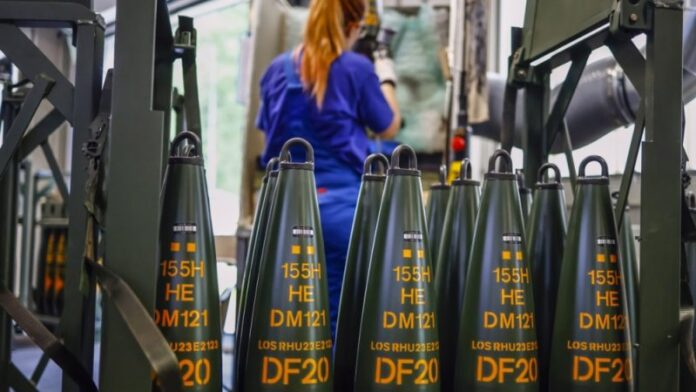The European Commission on Wednesday published its first call for industries to benefit from EU funds to ramp up their production capacities of ammunition and missiles, according to Euractiv.
In the Act in Support of Ammunition Production’s (ASAP) work programme drafted together with EU member states, the EU executive lays out the types of production capacities to produce ammunition faster eligible to receive a share of the €500 million fund: explosives, powder, shells, missiles, and testing and re-conditioning of older ammunition such as Soviet-era dated ammunition.
The ASAP fund, proposed by the European Commission last spring, aims to incentivise defence companies in the EU and Norway to ramp up ammunition production and avoid bottlenecks in the supply chain to meet the needs of EU countries and for Ukraine aid.
Europe’s defence industry has been reluctant to invest in new production lines until receiving clear orders from governments, as they wish to avoid unnecessary investments.
Negotiations on the work programme took EU member states less than two months, which was “very fast,” two EU diplomats acknowledged to Euractiv, considering they had to revise the draft four times.
With the work programme, member states put a focus on the reduction of lead production time and elimination of bottlenecks for explosives that will benefit from €190 million, and powder-related projects to which they allocated €144 million.
A total of €90 million was announced for increased production capacity of shells, including support for procurement. Missile production ramp-up was granted €40 million.
Finally, reconditioning and testing of older shells – especially for the Soviet-era standard ones heavily used by the Ukrainians – is allocated €4.3 million.
In addition to that, the so-called “Ramp-up Fund” of the ASAP regulation, used especially to provide smaller companies with leverage and guarantee to ease access to private funds, will be worth €30 million.
Defence companies will now have until mid-December to answer the call for proposals. Once the EU executive has selected the beneficiaries of the funds, the projects will be selected in February, reports Euractiv.
“Indicatively, first grants with associated funding could be signed in April,” a Commission source told Euractiv. Grants will then be disbursed with retroactive effect for projects started after March, when member states gave their political green light to present the proposal.
As a means to prolong the emergency regulation to speed up production lead times, the European Commission will present a European Defence Industry Strategy beginning of next year, Breton confirmed to Euractiv earlier this week.
The initial proposal sent out to the member states for approval end of August included four strands of financing opportunities, two of which were not product-driven but rather by a motivation to improve cross-border cooperation between the member states, a person with knowledge of the document told Euractiv under the condition of anonymity.
First, projects to set up new cross-border production lines for explosives, powder and shells. Second, expansion of existing cross-border production lines for explosives, powder and shells. Third, missiles. Fourth, testing and reconditioning of old ammunition – which was important for Eastern and Central Europeans, whose stockpiles and industry traditions date back to the Soviet era, wanted their own companies to benefit from the fund.
Some member states had an issue with the fact that trans-border cooperation was mandatory in two of the first calls for proposals, when it wasn’t a mandatory criterion established as such in the regulation, pushing the Commission to come up with new proposals for the work programme.
The second and third drafts created different calls for explosives, powder and shells – as it stands in the final text. But they were again rejected by some member states because they created a distinction between the “short-term” projects and the “long-term” projects for the explosives and shells.
A few EU countries complained that the difference was not clear and would need a definition for industries to understand which call to apply to, the source with knowledge of the talks said.
The situation led the Commission to propose a final draft last week which was the final one to be adopted.


